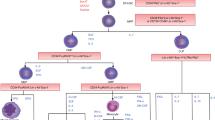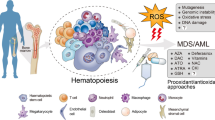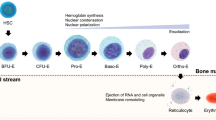Abstract.
One function of bone marrow megakaryocytes (MKs) is the controlled release of platelets into the circulation. Over the past few years, molecular mechanisms that contribute to MK development and differentiation have begun to be elucidated. This review provides a brief overview of megakaryopoiesis and platelet function, and the importance of selected hematopoietic transcription factors (including GATA-1, FOG, Fli-1, AML1, and NF-E2) and target genes in this biological process. In addition, a discussion of human diseases affecting megakaryopoiesis and mouse models of thrombocytopenia are presented with emphasis on how these systems have and will continue to provide further insights into mechanisms that control the biological functions of the megakaryocytic cell lineage. Ultimately, such knowledge may provide the basis for novel therapeutic approaches for modulation of platelet number and function.
Similar content being viewed by others
Author information
Authors and Affiliations
Corresponding author
Additional information
Received 26 April 2006; received after revision 9 June 2006; accepted 4 July 2006
Rights and permissions
About this article
Cite this article
Szalai, G., LaRue, A.C. & Watson, D.K. Molecular mechanisms of megakaryopoiesis. Cell. Mol. Life Sci. 63, 2460–2476 (2006). https://doi.org/10.1007/s00018-006-6190-8
Published:
Issue Date:
DOI: https://doi.org/10.1007/s00018-006-6190-8




